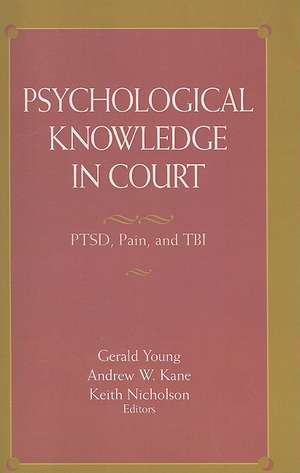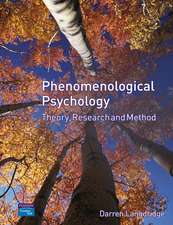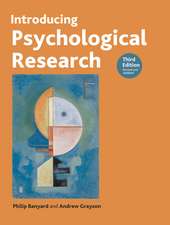Psychological Knowledge in Court: PTSD, Pain, and TBI
Editat de Gerald Young, Andrew W. Kane, Keith Nicholsonen Limba Engleză Paperback – 29 oct 2010
Psychological Knowledge in Court focuses on this triad separately and in combination, creating a unique guide to forensic evaluations that fulfills both legal and clinical standards. Its meticulous review of the literature identifies and provides clear guidelines for addressing core issues in causality, chronicity, and assessment, such as:
- Are there any definable risk factors for PTSD?
- How prevalent is PTSD after trauma?
- How do patients’ emotions relate to their pain experience?
- Are current pain assessment methods accurate enough?
- What is the role of pre-existing vulnerabilities in traumatic brain injury?
- What exactly is "mild" TBI?
| Toate formatele și edițiile | Preț | Express |
|---|---|---|
| Paperback (1) | 686.05 lei 6-8 săpt. | |
| Springer Us – 29 oct 2010 | 686.05 lei 6-8 săpt. | |
| Hardback (1) | 640.23 lei 6-8 săpt. | |
| Springer Us – 5 ian 2006 | 640.23 lei 6-8 săpt. |
Preț: 686.05 lei
Preț vechi: 807.11 lei
-15% Nou
Puncte Express: 1029
Preț estimativ în valută:
131.36€ • 136.78$ • 108.99£
131.36€ • 136.78$ • 108.99£
Carte tipărită la comandă
Livrare economică 14-28 februarie
Preluare comenzi: 021 569.72.76
Specificații
ISBN-13: 9781441938121
ISBN-10: 1441938125
Pagini: 428
Ilustrații: XVI, 412 p.
Dimensiuni: 155 x 235 x 22 mm
Greutate: 0.6 kg
Ediția:Softcover reprint of hardcover 1st ed. 2006
Editura: Springer Us
Colecția Springer
Locul publicării:New York, NY, United States
ISBN-10: 1441938125
Pagini: 428
Ilustrații: XVI, 412 p.
Dimensiuni: 155 x 235 x 22 mm
Greutate: 0.6 kg
Ediția:Softcover reprint of hardcover 1st ed. 2006
Editura: Springer Us
Colecția Springer
Locul publicării:New York, NY, United States
Public țintă
Professional/practitionerCuprins
to Psychological Knowledge in Court: PTSD, Pain, and TBI.- Psychology, Causality, and Court.- PTSD/Distress.- Understanding PTSD: Implications for Court.- Posttraumatic Disorders Following Injury: Assessment and Other Methodological Considerations.- Predicting Who Will Develop Posttraumatic Stress Disorder.- Assessment of Psychological Distress and Disability After Sexual Assault in Adults.- Chronic Pain.- Pain in the 21st Century: The Neuromatrix and Beyond.- Influence of Personality Characteristics of Pain Patients: Implications for Causality in Pain.- Effect of Cognition on Pain Experience and Pain Behavior: Diathesis-Stress and the Causal Conundrum.- Chronic Pain and Affect as a Nonlinear Dynamical System.- Objective and Subjective Measurement of Pain: Current Approaches for Forensic Applications.- PTSD and Pain.- Posttraumatic Stress Disorder and Whiplash After Motor Vehicle Accidents.- PTSD and Chronic Pain: Cognitive-Behavioral Perspectives and Practical Implications.- Comorbid Chronic Pain and Posttraumatic Stress Disorder Across the Lifespan: A Review of Theoretical Models.- Traumatic Brain Injury.- Mild Traumatic Brain Injury: Definitions.- Mild Traumatic Brain Injury: Neuropsychological Causality Modelling.- Mild Traumatic Brain Injury: Causality Considerations from a Neuroimaging and Neuropathology Perspective.- Confounding Effects of Pain, Psychoemotional Problems or Psychiatric Disorder, Premorbid Ability Structure, and Motivational or Other Factors on Neuropsychological Test Performance.- Neuropsychological Assessment of Moderate to Severe Traumatic Brain Injury.- Conclusions.- Conclusions on Psychological Knowledge in Court: PTSD, Pain, and TBI.
Recenzii
In Psychological Knowledge in Court: PTSD, Pain, and TBI, Gerald Young, Andrew W. Kane, and Keith Nicholson provide forensic psychologists, both new and experienced, with 20 well-selected chapters that should be read by anyone likely to testify in a courtroom. The selections cover much more than the title suggests. The editors provide an insightful and practical discussion of what is required when providing expert testimony. . . I do recommend Psychological Knowledge in Court, and I encourage any psychologist likely to be testifying as an expert witness to buy it and read it.
- John L. Caccavale, PsycCRITIQUES, Volume 51 (26), Article 11
PTSD, pain syndromes, traumatic brain injury: these three areas are common features of personal injury cases, often forming the cornerstone of expert testimony. Yet their complex interplay in an individual can make evaluation-and explaining the results in court-extremely difficult. Psychological Knowledge in Court focuses on this triad separately and in combination, creating a unique guide to forensic evaluations that fulfills both legal and clinical standards. Its meticulous review of the literature identifies and provides clear guidelines for addressing core issues in causality, chronicity, and assessment.
- R.K. McKinzey, Ph.D., Editor, WebPsychEmpiricist: www.wpe.info
- John L. Caccavale, PsycCRITIQUES, Volume 51 (26), Article 11
PTSD, pain syndromes, traumatic brain injury: these three areas are common features of personal injury cases, often forming the cornerstone of expert testimony. Yet their complex interplay in an individual can make evaluation-and explaining the results in court-extremely difficult. Psychological Knowledge in Court focuses on this triad separately and in combination, creating a unique guide to forensic evaluations that fulfills both legal and clinical standards. Its meticulous review of the literature identifies and provides clear guidelines for addressing core issues in causality, chronicity, and assessment.
- R.K. McKinzey, Ph.D., Editor, WebPsychEmpiricist: www.wpe.info
Caracteristici
Focuses on key area that often involve medical-legal disputes (PTSD, sexual assualt, chronic pain, traumatic brain injury) Includes supplementary material: sn.pub/extras













